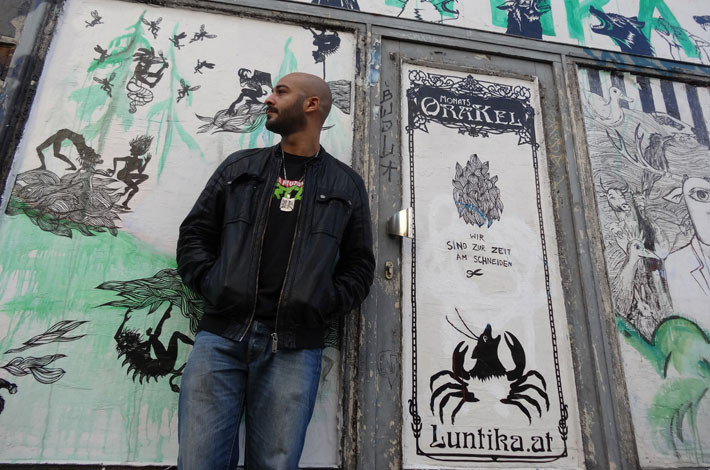JAN-PETER WESTAD visits the 18th biennial Poetry International Festival, part of the Southbank Centre’s summer Festival of Love. The Festival, founded by Ted Hughes in 1967, runs from Thursday 17th – Monday 21st July and will feature over 100 poets, musicians, artists and performers from more than 20 countries.
Ted Hughes, in his programme notes to the first Poetry International Festival, wrote that poetry: ‘Is a universal language of understanding in which we can all hope to meet’. Arriving at the festival on Friday, the hottest day of the year so far, there was unmistakably a sense of this universal communion. Perhaps there was even a hint of the Wordsworthian sublime, as children screamed and played in the fountain and people milled about the sun-drenched Southbank. Many of the events wonderfully reflect this relaxed festival air, notably the musical renditions of Elizabeth Bishop’s works. Whilst the notoriously meticulous and retiring poet was probably turning in her grave, the audience certainly enjoyed a show that was never in danger of taking itself too seriously.
Highly recommended is the permanent installation, FilmPoem, a project by filmmaker and photographer Alistair Cook. The project aims to respond to ‘the power of a text sparking the imagination with visual connections and metaphor.’ The showcase includes 18 videos that involve collaborations with various poets. Included are Linda France, whose poem won the National Poetry Competition in 2013, and Iraqi poet Zaher Mousa, whose work is read in his native Arabic tongue, without subtitles. The images are shown in a found-footage style with a grainy lack of clarity that allows the poetry to remain at the fore. The jarring skipping and repetition of frames, matched with ethereal simplistic orchestral chords creates subtle and engrossing sensual experience that showcases the medium of poetry being stretched to new limits beyond the page.
For those in favour of a more traditional representation of poetry, the foyer of the Royal Festival Hall plays current poets and writers reading their favourite love poems as well as new works from the likes of Andrew Motion and Alan Hollinghurst. Nestled amongst beanbags listening to Shakespearean sonnets or Romantic love lyrics there was a real sense of escapist tranquility. Or at least, it was tranquil before there came the sound of what I soon discovered to be Mohamed El Deeb, an Egyptian hip-hop artist. The important political inclinations that make the festival so special had finally arrived.
Jude Kelly, Southbank Centre’s Artistic Director, states in her introduction to the festival: ‘The festival was created to get poetry out from behind the Iron Curtain and to confront people with work from abroad that would unsettle and inspire them. It is Hughes’ political and poetic vision that has formed the heart of the festival ever since: to see the world as it is now, to understand what it’s like to write from under censorship, suppression or conflict and to experience some of the greatest poetry, spoken word and rap being written today.’ El Deeb was performing to a group of secondary school students alongside members of Spoken Word Educators, a group determined to educate through the medium of poetry. Here, the different forms of poetry, as well as its various benefits through practical application, were made clear. Joelle Taylor, spoken word artist, told the eager audience how spoken word ‘raises literacy, but more importantly, emotional literacy in the schools and prisons where we work.’

Spoken word is being used throughout the world to give people a voice. Role models in the spoken word poetry scene are becoming increasingly valued. One such role model, Jay Bernard, took to the stage in the afternoon. The LGBT+ poet and winner of the Poetry Society’s Foyle Young Poets of the Year Award in 2005 painted a very different picture of London, one of chicken bones rattling on the night-bus floor where oppression is by no means a fiction. Alongside her was British-Somali poet Warsan Shire, whose collection ‘Teaching my Mother how to give Birth’ powerfully rendered the complex difficulties of reconciling religious, cultural and sexual identity in a violent yet tender world. These fantastic poets highlight how the intimacy of poetry can connect an audience to universal struggles that might have before seemed distant.
By showcasing the finest talent, the Poetry International Festival not only lifts poems from their native birthplace, but also brings them together, transcending mediums and traditions to achieve poetic universality. It is certainly worth a visit.
Notable events still to come (free and ticketed): Poetry Picnic, National Poetry Competition Reading, Literary Activism: Is Poetry the Strongest form of protest?, David Constantine 70th Birthday Celebration, Poetry International Finale and many other talks, workshops and performances. For more information click HERE





